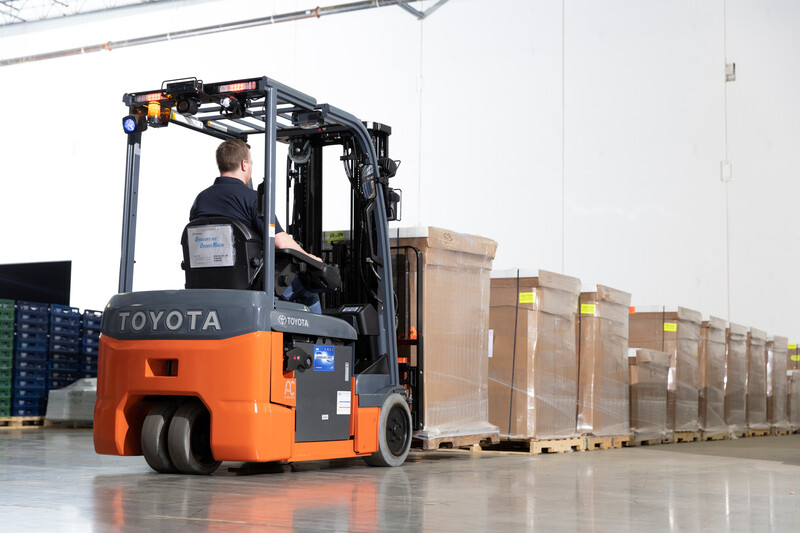Sustainability has become a key focus in industries across the globe, and the material handling sector is no exception. As companies strive to reduce their environmental footprint, many are looking for ways to adopt greener practices in their operations. Toyota, a global leader in the forklift industry, has embraced this challenge by developing equipment and technologies that support sustainable material handling.
In this blog, we’ll explore how Toyota forklifts contribute to sustainability and how they can help your business meet its environmental goals while maintaining high levels of efficiency and productivity.
1. Energy-Efficient Electric Forklifts
One of the most impactful ways Toyota promotes sustainability is through its line of energy-efficient electric forklifts. These forklifts are designed to reduce reliance on fossil fuels, lower carbon emissions, and minimize energy consumption.
Benefits of Toyota Electric Forklifts:
– Zero Emissions: Toyota electric forklifts produce zero tailpipe emissions, making them an eco-friendly alternative to internal combustion (IC) forklifts. This is especially beneficial for indoor operations where air quality is a concern.
– Lower Energy Consumption: Toyota electric forklifts are equipped with advanced technology that optimizes energy use, allowing for longer battery life and reducing overall energy costs.
– Lithium-Ion Battery Technology: Toyota’s use of lithium-ion batteries in some models offers higher energy efficiency, faster charging times, and longer-lasting performance compared to traditional lead-acid batteries, further reducing the environmental impact of material handling operations.
—
2. Alternative Fuel Solutions
In addition to electric forklifts, Toyota has developed alternative fuel options for those who require the power of internal combustion forklifts but want a more sustainable solution. Toyota’s IC forklifts are available in models that run on compressed natural gas (CNG) and liquefied petroleum gas (LPG), both of which are cleaner-burning fuels than traditional diesel or gasoline.
Benefits of Alternative Fuels:
– Lower Greenhouse Gas Emissions: CNG and LPG produce fewer greenhouse gases compared to gasoline or diesel, helping to reduce the carbon footprint of your operations.
– Cleaner Combustion: These fuels burn cleaner, meaning fewer harmful pollutants are released into the air, contributing to better air quality in and around the workplace.
—
3. Reduced Environmental Impact Through Manufacturing
Toyota doesn’t just focus on sustainability in its forklift designs; it also takes a holistic approach by adopting environmentally responsible manufacturing processes. Toyota Material Handling factories are designed to minimize waste, reduce energy consumption, and promote recycling.
Toyota’s Sustainable Manufacturing Practices Include:
– Waste Reduction: Toyota’s factories strive to reduce waste in the manufacturing process by recycling materials and minimizing the amount of waste sent to landfills.
– Energy Efficiency: Toyota’s production facilities use energy-efficient equipment and systems, including the use of renewable energy sources where possible, to lower the environmental impact of manufacturing.
– Environmental Certifications: Toyota’s commitment to sustainability is evident in its achievement of various environmental certifications, such as ISO 14001, which recognizes organizations for their effective environmental management systems.
—
4. Prolonging Equipment Lifespan Through Durability and Maintenance
One often-overlooked aspect of sustainability is the longevity of the equipment. Toyota forklifts are known for their durability and reliability, which means they stay in service longer, reducing the need for frequent replacements and minimizing waste.
How Toyota Forklifts Promote Longevity:
– High-Quality Materials: Toyota forklifts are built with premium materials and components that are designed to withstand heavy use in demanding environments, which extends the lifecycle of the equipment.
– Regular Maintenance Programs: Toyota offers comprehensive maintenance programs that help extend the lifespan of their forklifts, ensuring they operate efficiently for longer periods. Proper maintenance reduces the need for repairs and replacements, contributing to more sustainable use of resources.
—
5. Innovative Green Technologies
Toyota continues to innovate by incorporating green technologies that further enhance sustainability. For example, Toyota has invested in regenerative braking systems, which capture energy during braking and store it for future use, reducing energy consumption and maximizing efficiency.
Key Green Technologies in Toyota Forklifts:
– Regenerative Braking: Converts kinetic energy from braking into electrical energy, which can be reused to power the forklift, reducing energy waste.
– Telematics for Efficiency: Toyota’s telematics systems allow operators to monitor forklift performance, optimize routes, and track energy usage, helping businesses minimize fuel or energy waste.
—
Toyota’s commitment to sustainable material handling is clear in every aspect of its forklift operations, from the development of energy-efficient electric models to eco-friendly manufacturing processes. By investing in Toyota forklifts, businesses can reduce their environmental impact while maintaining high levels of productivity. Whether through zero-emission electric forklifts, cleaner-burning alternative fuels, or innovative green technologies, Toyota forklifts play a critical role in helping companies embrace sustainable material handling practices.
For companies looking to reduce their carbon footprint and operate more sustainably, Toyota forklifts offer a proven solution that combines environmental responsibility with operational excellence.
